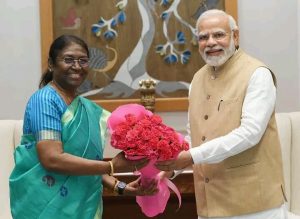India’s upcoming presidential election will see the ruling Bharatiya Janata Party’s candidate Draupadi Murmu take on the opposition’s nominee, Yashwant Sinha. Murmu is expected to win the contest as the BJP and its allies have the numbers to propel her to the top post.
Article 62(1) of the Indian Constitution mandates that “an election to fill a vacancy caused by the expiration of the term of office of President shall be completed before the expiration of the term.” Current President Ram Nath Kovind’s tenure ends on July 25.
The presidential election will be held on July 18. An electoral college comprising of elected members of both houses of parliament, and elected members of legislatures of all of India’s states and union territories, will cast their vote that day. Votes will be counted on July 21, and the new president – India’s 15th—will be sworn in on July 25.
In recent weeks, the ruling party and its allies as well as opposition parties have been engaging in hectic discussions to decide on the person they will field in the election.
On the opposition’s list were three veteran parliamentarians – Nationalist Congress Party leader Sharad Pawar, former Chief Minister of Jammu and Kashmir Farooq Abdullah, and former Governor of West Bengal Gopalkrishna Gandhi. With all three opting out of the race, Sinha, a former BJP leader who has held the finance and external affairs portfolios in the past, emerged the opposition’s candidate for the presidential election.
The BJP-led alliance’s pick, Murmu, is a tribal woman; she belongs to the Santhal tribe. A former governor of Jharkhand state, she had pushed back on legislations that were unfair to tribal communities. After Murmu’s stint as governor ended in 2017, the BJP lost power in Jharkhand.
Following the announcement of Murmu’s candidacy, BJP members have been singing her praises. Speaking to The Diplomat, BJP’s Delhi unit chief Adesh Gupta described her as the best choice of the party leadership. “Madam Murmu has worked very hard in life and deserves this opportunity to steer forward the growth of the tribal community,” he said.
As for Sinha, after his name was proposed as the opposition’s presidential candidate, the former BJP leader has been issuing strong statements regarding the power and position of the president in the Indian democratic landscape. In a recent address, he said that the country should not have a “rubber-stamp president.” The battle is not between two individuals, he said, but between two ideologies.
A former union minister, Sinha has remarked that the BJP-led government is moving on a road that is not good for the country. “Youngsters are suffering” and now, the government has played a “joke” on unemployed youth with its new scheme for military recruitment. The recently-announced Agnipath scheme provides them with no long-term job security. In the past, Sinha has also called out the BJP for its lack of structured policies to support farmers, daily wage workers, unemployed youth, women, and all marginalized sections of the society.
India’s outgoing president, Kovind, has supported controversial and extremely anti-people policies and politics pushed by the BJP government. From revoking constitutional rights and guarantees promised to the people of Jammu and Kashmir to hailing the anti-Muslim and discriminatory Citizenship Amendment Act as well giving his assent to controversial farm laws, which were eventually rolled back, Kovind has been hand in glove with the BJP government in dampening the pro-people spirit of India’s democracy.
Kovind is a Dalit. His rise to the post of president was seen as an empowering move for Dalits and backward castes across India. However, his tenure at the helm has seen little improvement in the life of Dalits in the country, as they continue to face violence and are forced to do jobs deemed too dirty – such as cleaning dry toilets and drains – by other castes.
Analysts are predicting a clear win for Murmu. In addition to its strong presence in the national parliament and state legislatures, the BJP is expected to receive the support of its regional allies, including the Biju Janata Dal, All India Anna Dravida Munnetra Kazhagam, and the Yuvajana Shramika Rythu Congress Party in the presidential poll.
Unlike the BJP-led coalition, which solidly backs Murmu, sources in the Congress Party told The Diplomat that many within the opposition Congress-led United Progressive Alliance are not supportive of Sinha as the presidential candidate.
India is gearing up for a tribal woman as its president for the first time.
As president, Murmu will face several challenges. Will she end up quietly assenting to all the legislations and policies that the Narendra Modi government sends to her office?
India’s democracy and social fabric are in tatters. Will she pull up the government when it fails to live up to the principles that the constitution lays down? Importantly, will she speak up against the unfair and illegal appropriation of tribal land by businesses? It seems unlikely at this point.

































